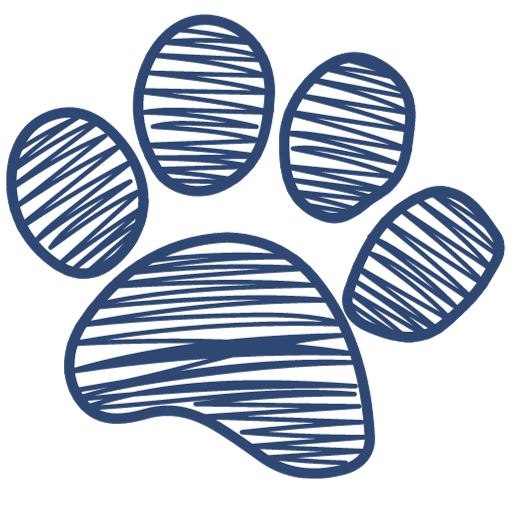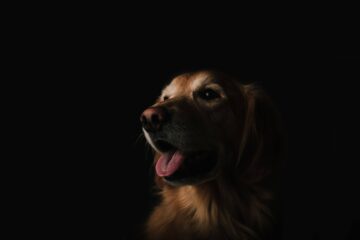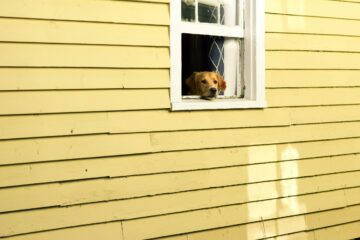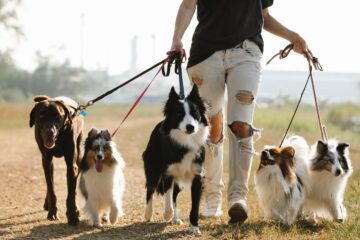Ever found yourself wondering, Why does my dog drink so much water at night?
It’s a common concern among pet owners, and in this guide, we’ll dive into the mystery behind your canine companion’s nighttime hydration habits.
Dogs, like humans, have their own unique rhythms and habits, and understanding the reasons behind their behaviors is key to ensuring their health and well-being.
Nighttime water consumption is a behavior that can vary widely among individual dogs, and deciphering the factors at play provides valuable insights into their physiological and psychological state.
Unraveling the reasons for your dog’s increased water intake after the sun goes down can provide valuable insights into their well-being.
Table of Contents
10 Reasons – Why My Dog Drinks So Much Water at Night
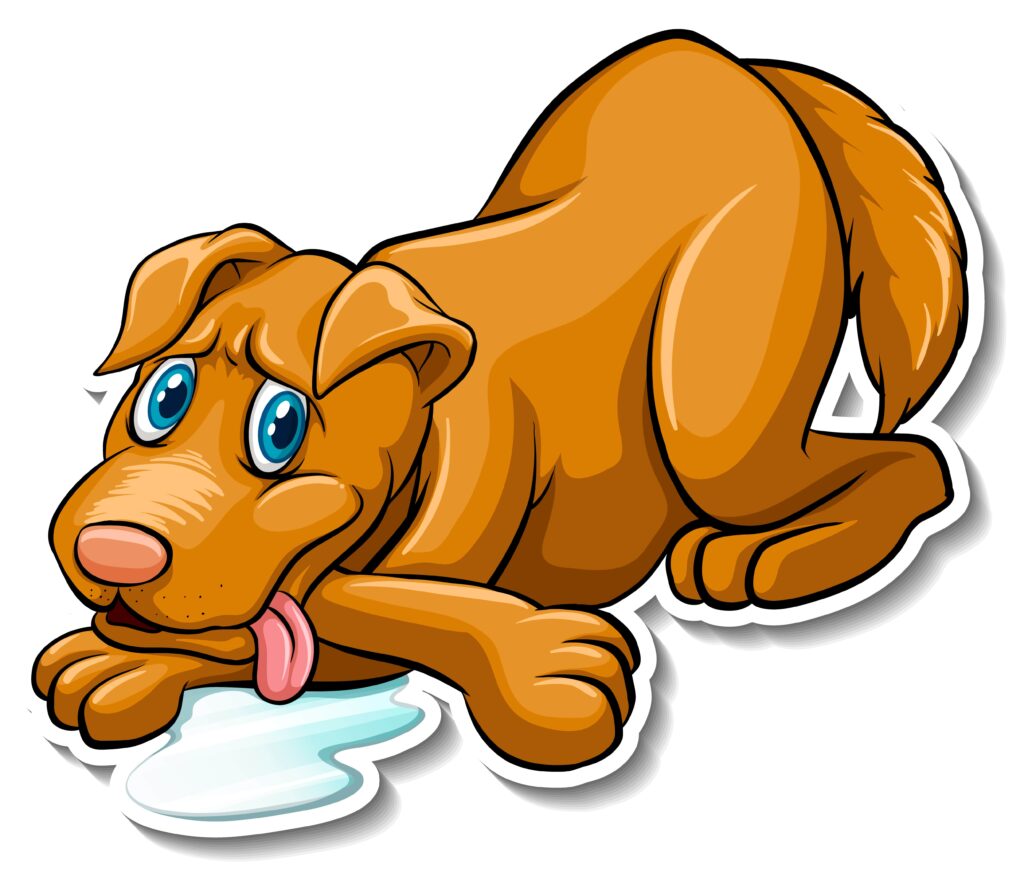
1] Post-Playtime Hydration
After an energetic round of play in the evening, it’s only natural for your dog to be a bit parched.
Dogs dissipate heat through panting, and during play, their bodies generate extra warmth.
A water break is crucial for them to cool down and rehydrate, especially if they’ve been engaged in activities like fetch or a moonlit stroll.
Remember, just as we grab a drink to refresh ourselves after physical exertion, dogs too need to replenish their fluids to stay properly hydrated.
2] Dinner Digestion
Late dinners or midnight snacks can trigger an increased need for water.
When your dog indulges in a culinary delight, the digestive process kicks in, prompting the body to seek additional hydration to aid in the breakdown of the consumed food.
This connection between food intake and increased water consumption is a normal part of your pup’s digestion routine.
Tip: “Monitor your dog’s water habits after meals, considering the connection between food digestion and hydration.”
3] Weather-Induced Thirst
External factors, such as weather conditions, significantly influence a dog’s water intake.
Hot or dry climates may leave your dog feeling thirstier, particularly if they’ve spent time outdoors in the evening.
Dogs regulate their body temperature through panting, and increased panting can lead to higher water requirements.
Checking the weather forecast can offer insights into whether your dog’s nighttime water cravings are simply a response to climate-induced thirst.
4] Medical Considerations
A sudden and notable change in your dog’s nighttime water consumption might signal an underlying health concern.
Conditions like diabetes or kidney problems can lead to excessive thirst. If you observe a significant shift in your dog’s drinking habits, it’s crucial to consult with your veterinarian.
They can conduct tests to rule out any potential health issues and provide appropriate guidance based on the findings.
• Sudden change in nighttime water consumption may signal health concerns • Excessive thirst could indicate conditions like diabetes or kidney problems • Consult your veterinarian for tests to rule out health issues • Receive appropriate guidance based on the findings.
5] Medication Side Effects
Certain medications can have side effects, and increased thirst is a common one.
If your dog is on medication, it’s essential to consider the potential impact on their hydration levels.
Discuss any observed changes in your dog’s water intake with your vet, as they may need to adjust the medication dosage or explore alternative options to manage potential side effects.
6] Age-Related Changes
As dogs age, their physiological functions can undergo changes.
Senior dogs, in particular, may experience increased thirst as a result of conditions like kidney disease or merely due to the aging process.
Adapting to these changes involves providing additional water as needed and ensuring your senior canine companion receives proper veterinary care for age-related considerations.
Tip: “Provide water as required and understand age-related changes in your senior dog’s water habits.”
7] Anxiety or Stress
Dogs are sensitive to stress and anxiety, and they may resort to comforting behaviors to cope.
If your dog experiences nighttime stress or anxiety, drinking water can be a calming activity for them.
Evaluate their environment and daily routine for potential stressors, and consider incorporating relaxation techniques or providing a safe and secure sleeping space to alleviate anxiety.
8] Dehydration Concerns
Surprisingly, inadequate daytime water intake can lead to increased thirst at night.
If your dog isn’t drinking enough water during the day, their body may compensate by prompting them to drink more at night.
Ensure your dog has constant access to fresh water throughout the day, encouraging regular hydration.
Establishing a consistent water-drinking routine during daylight hours can help prevent a surge in nighttime thirst.
Tip: “Encourage daytime drinking habits to establish a balanced hydration routine.”
9] Increased Activity Levels
A sudden spike in your dog’s activity levels, such as starting a new exercise routine or engaging in more vigorous play, can contribute to heightened thirst.
Dogs, like humans, need extra hydration to support increased physical activity.
Consider any recent changes in their daily activities that might be prompting the need for additional water intake during the night.
10] Routine Behavior
Dogs thrive on routines, and if your pup has developed a nightly water-drinking ritual, it could be more of a habitual behavior than a physiological need.
Assess whether the water-drinking pattern aligns with their routine and if it has become a learned behavior associated with the evening hours.
Understanding whether it’s a habit or a genuine need will guide you in managing your dog’s nighttime water intake effectively.
Tip: “Embrace routine behaviors that align with your dog’s natural habits, ensuring a healthy nightly ritual.”
Why Does My Dog Drink So Much Water at Night: FAQs
Is it normal for dogs to drink a lot of water at night?
Yes, occasional nighttime water consumption is normal, especially after activities, meals, or due to environmental factors. However, consistent excessive drinking may warrant a closer look and a vet visit.
Can anxiety cause increased water intake in dogs?
Yes, anxiety or stress can lead to increased water consumption in dogs. Addressing the underlying causes of anxiety and creating a calm environment may help regulate your dog’s drinking habits.
Should I limit my dog’s water intake at night?
In general, it’s essential to ensure your dog has access to water. However, if excessive nighttime drinking becomes a concern, consult your vet for guidance on managing water intake while addressing any underlying issues.
Are there specific signs of dehydration in dogs?
Signs of dehydration include dry gums, lethargy, sunken eyes, and loss of skin elasticity. If you suspect dehydration, consult your vet promptly for evaluation and appropriate intervention.
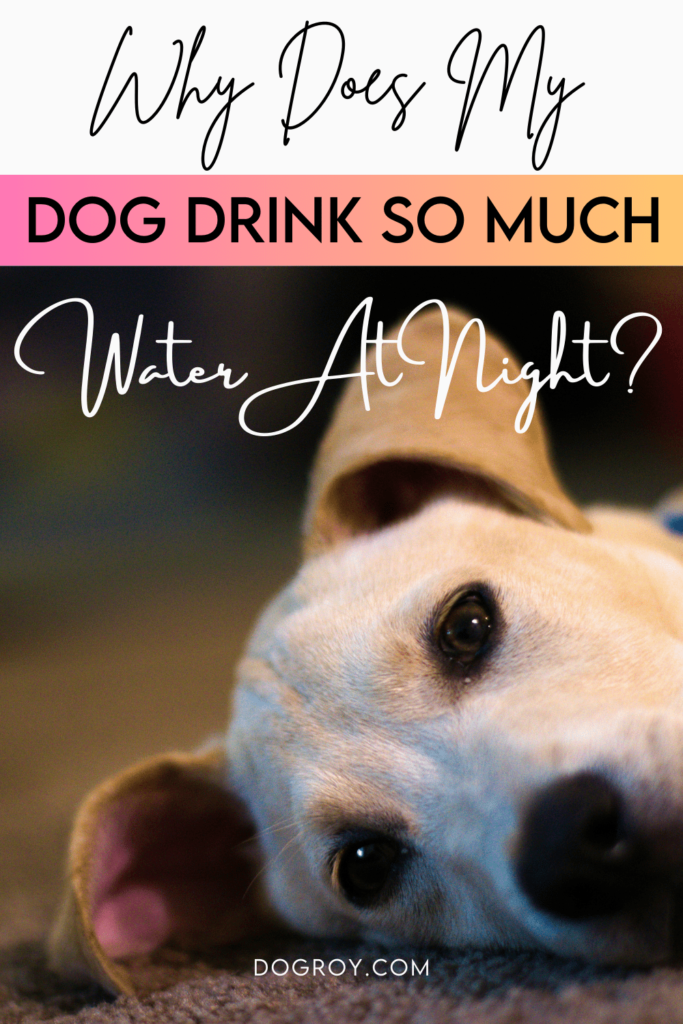
In conclusion, Here are 10 compelling reasons that shed light on the question, Why does my dog drink so much water at night.
Understanding the various factors contributing to your dog’s increased water consumption at night is essential for responsible pet ownership.
The 10 reasons explored in this guide offer a comprehensive look into the possible explanations behind this behavior.
Remember, changes in water-drinking habits could be indicative of underlying health issues, so it’s always wise to monitor your dog’s behavior and consult with a veterinarian if needed.
By staying informed, you can ensure your furry friend’s well-being and foster a happy and healthy life together.
